Top 10 Random Topic Generator Tools in 2025

That moment you remember when you are in front of your computer with a blank page and you have to write your next brilliant concept but your brain feels empty? Ugh, the most terrible one. It is as if all the best ideas were already used. Well, surprise. You are definitely not the only one. The creative struggle is a real thing and is a significant problem that many marketers and content creators face. In fact, a recent survey found that over 60% of experts suffer from writer’s block at least once a week.
And with that many articles going up, we’re talking about an estimated 7.5 million fresh blog posts every day, it’s brutally competitive out here. You can’t just work harder; you have to work smarter and hunt down those original takes. That’s where a Writing prompt generator steps in like a superhero. It’s your secret weapon for turning creative frustration into a source of fantastic ideas. It can help you escape the same old rut and discover fresh, new ground so your content is constantly new and engaging—perfect for publishing across multiple blog submission sites.
Ready to meet your new best friend? In this blog, we’ll discuss the best random topic generator tools of 2025 that can help you trigger creativity in an instant.
Why Use a Random Topic Generator in 2025
In a world where everyone needs a never-ending source of material, these tools are more than a short-term solution; they’re a whole game-changer for your workflow. They allow you to skip the “what am I even supposed to write?” step and dive into the good stuff right away. Here’s why you should have one in your toolkit:
- Silencing writer’s block: The blank page is intimidating, but an arbitrary topic generator gives you a quick starting point. It’s like receiving a little creative push to get you going.
- Finding new trendy niches: Through spewing out surprises, such devices can dare you to write on new and interesting subjects that you may not have thought of otherwise. Hello, new group to reach out to!
- Keep current: The great ones leverage AI to scan trending phrases and the actual things people are looking for, so you know their suggested topics are of interest and will actually have a shot at being viewed.
- Accelerate your workflow: Without spending hours trying to think of ideas, you can generate more content in less time. That’s essential to keeping your online presence up-to-date and your audience interested.
- Fun team meetings: A random topic generator can be a creative, engaging way to get your whole team thinking together, sparking discussions and group brainstorming.
Core Features You Should Expect
Random topic generators have progressed! They’re not necessarily random word pairings anymore! When selecting a tool, keep an eye out for these remarkable attributes that can truly supercharge your work:
- AI-based suggestions: The top tools use smart AI to give you tips that are not random, but actually get the job done for your industry. It’s having a genius sidekick!.
- Category by subject: This enables you to limit search outcomes to align with what you’re genuinely interested in, such as money, technology, or marketing, so you get more precise and relevant suggestions.
- Content outline support: Some tools not only give you a topic, but they can even generate a rough outline with headings and subheadings. It’s a fantastic head start!
- SEO insights: An excellent random topic generator would likely give you a snapshot of statistics such as estimated search volume and keyword difficulty, so you can select topics most likely to rank.
- Customization and filters: Having the ability to filter results based on what you’re writing (a blog post, a video script, a social media caption) is a complete lifesaver.
Comparison Table: Name, Best For, Standout Feature
| Name | Best For | Standout Feature |
| HubSpot Blog Topic Generator | Beginners & Bloggers | Noun-based generation for quick ideas |
| TopicGenerator.org | Quick Inspiration & Brainstorming | Simple one-click generation |
| QuizBreaker | Remote Teams & Communication | Focus on conversation starters |
| RandomTopicGenerator.org | Speeches & Presentations | Clean, simple interface for quick ideas |
| Vondy Random Topic Generator | Creative Writers & Storytellers | AI-powered plot and genre suggestions |
| CodeBeautify | Technical Writers & Developers | Simple, no-frills tool for tech topics |
| Frase Blog Outline Generator | SEO Professionals & Agencies | SERP-driven outline generation |
| Scalenut Blog Idea & Outline Generator | Content Teams & Marketers | “Cruise Mode” for end-to-end content creation |
| B12 AI Blog Idea Generator | Small Business Owners | Business-focused and tailored ideas |
| Enrich Labs Random Topic Generator | Entrepreneurs & Innovators | Generates unique business concepts |
Top 10 Random Topic Generator Tools in 2025
1. HubSpot Blog Topic Generator

The HubSpot Blog Topic Generator is a classic for a reason. It is extremely easy: you just input a maximum of five nouns, and it returns a week’s worth of blog post titles. This tool is perfect for new users. By 2025, HubSpot is going to enhance its free tool with more sophisticated AI content creation just to make you not only come up with new topics but also write detailed blog drafts and outlines. It works with tried and tested headline formulas and ideal character lengths to create SEO-friendly and captivating titles, thus becoming a convenient all-in-one content assistant
Key Features:
- Noun-based generation
- title variations
- content ideas weekly.
Pros:
- Straightforward to use
- generates multiple titles based on simple input.
Cons:
- Constraining when it comes to blog post titles
- Suggestions may be generic
- There is no SEO data.
Best For: Beginners, bloggers, and small businesses that require quick and easy ideas.
Pricing: Free
Website: https://www.hubspot.com/blog-topic-generator
2. TopicGenerator.org

With TopicGenerator.org, you click a button and voila, you get an instant, new, random topic. It’s convenient when you only require that extra boost to initiate a brainstorming session. The questions are usually broad-based, so there’s plenty of scope for you to think outside the box. It’s perfect for us who are overwhelmed by an array of buttons and controls. In 2025, this tool will provide added functionality of providing suggestions for essays, speeches, and even dialogues, making it an all-around tool for most writing needs. Its simplicity makes it an excellent tool for quickly getting over a blank page and generating fresh blog topic ideas in seconds.
Key Features:
- One-click simple generation
- diverse categories (conversation, blog, essay).
Pros:
- Fast
- No-nonsense
- ideal for quick inspiration.
Cons:
- It has some of the more advanced features like AI or SEO data; occasionally, the topics are too random.
Best For: Casual content creators, students, and brainstorming.
Pricing: Free
Website: https://topicgenerator.org/
3. QuizBreaker
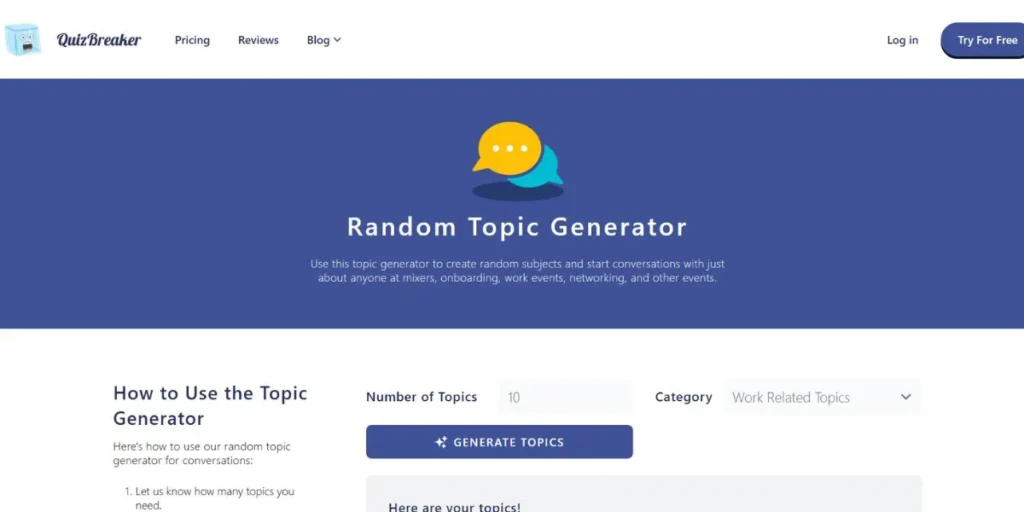
This one’s different; it’s for conversations! Although its main focus is on team-building icebreakers, the tool is also excellent for a remote team or anyone who wants to initiate a conversation. You could set topics such as traveling or hobbies so that the questions would be relevant. This is an excellent method to help the team build personal relationships. In 2025, QuizBreaker added AI to personalize better and make icebreaker questions more relevant based on the interests of your team. The platform also includes live multiplayer trivia and employee workstyle profiles, making it a comprehensive solution for all aspects of team engagement. It’s also a fun way to inspire creativity, offering unique creative writing prompts that can spark conversations or brainstorming sessions within the team.
Key Features:
- Subjects grouped by category
- team focus
- conversation starters.
Pros:
- Great for remote teams
- suitable for social interaction
- ease of use.
Cons:
- Not suitable for content creation
- very specialized use case.
Best For: Remote teams, company managers, and facilitators looking to increase team communication.
Pricing: Free for the generator. Paid subscription for the complete QuizBreaker website starts at $39/month.
Website: https://www.quizbreaker.com/
4. RandomTopicGenerator.org
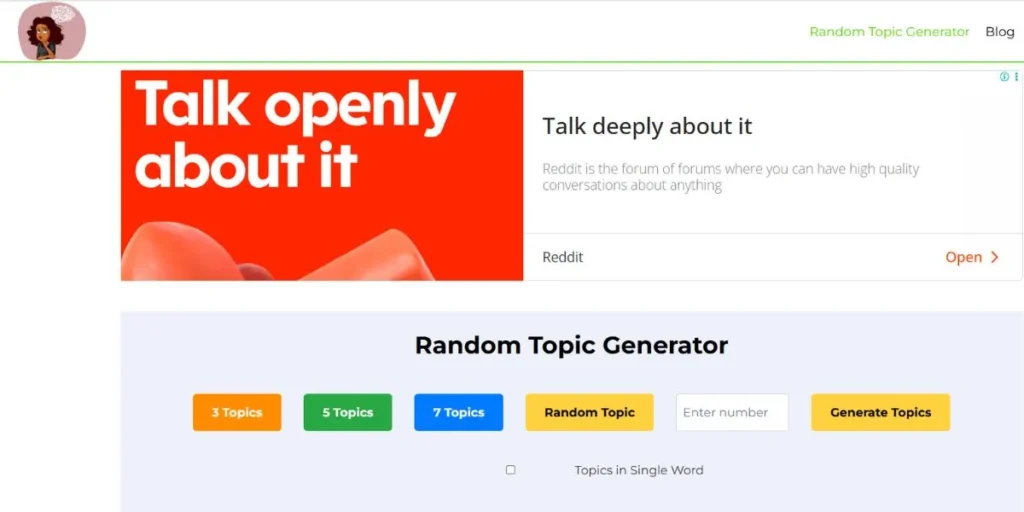
This is a treasure trove if you require a subject for a presentation or speech. The suggestions are usually stimulating and are nicely suited to a well-organized speech. It’s minimalistic, easy, and does the job without any frills—a true lifesaver if you need to give a talk in the near future and are coming up blank. The design of the tool is specifically tailored to the academic community, with content that can be easily converted into formal essays or research papers. For added convenience, it also works as an AI topic generator, helping users quickly discover fresh ideas and topics for speeches, presentations, or research projects. It’s also great for learning new things about something you already know.
Key Features:
- Speech and presentation emphasis
- intuitive interface.
Pros:
- Fast and efficient
- Free
- great for practicing public speaking.
Cons:
- In-depth topics are typically concrete
- may require additional research.
Best For: Public speakers, students, and anyone who is giving a speech.
Pricing: Free
Website: https://randomtopicgenerator.org/
5. Vondy Random Topic Generator
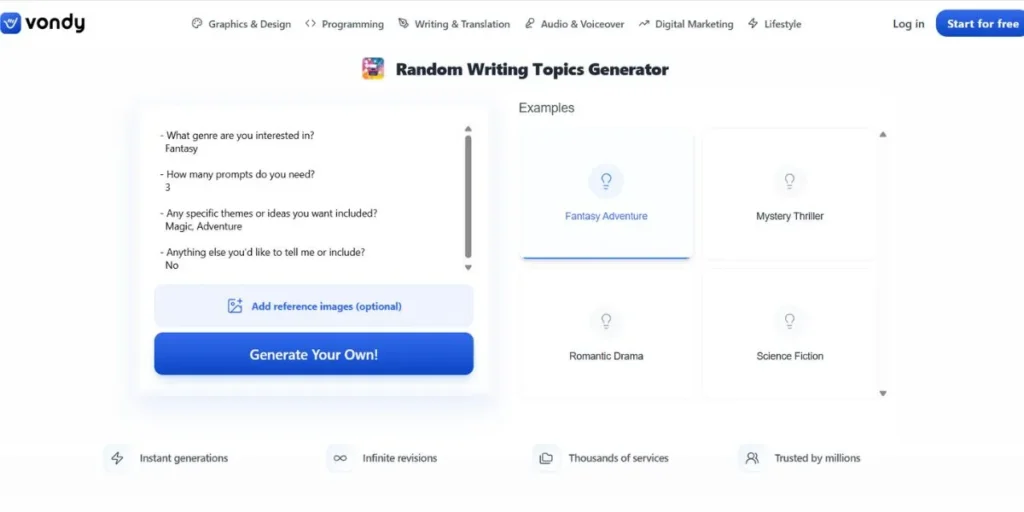
Vondy is a creative writer’s dream. It is a writing assistant based on artificial intelligence that is far more than just a topic generator. It gives you innovative solutions, including a genre as well as ideas for a plot! You can use it to write a fantasy, science fiction, or romance novel. It is ideal for screenwriters, authors, and anyone who loves to spin a tale. Vondy’s AI in 2025 has been enhanced to deliver more subtle and descriptive prompts, such as character drives and setting descriptions, that can significantly accelerate the creative process. All in all, it is an excellent writing inspiration tool for breaking through writer’s block and jumpstarting creative work.
Key Features:
- AI-based
- genre-specific prompts,
- idea generation for plots.
Pros:
- Excellent for creative writing
- highly customizable
- provides detailed prompts.
Cons:
- Not suitable for advertising or business-related writings
- mainly concentrates on creative writing.
Best For: Creative writers, novelists, and storytellers.
Pricing: Basic use is unrestricted. Paid plans are available for extra features.
Website: https://www.vondy.com/
6. CodeBeautify
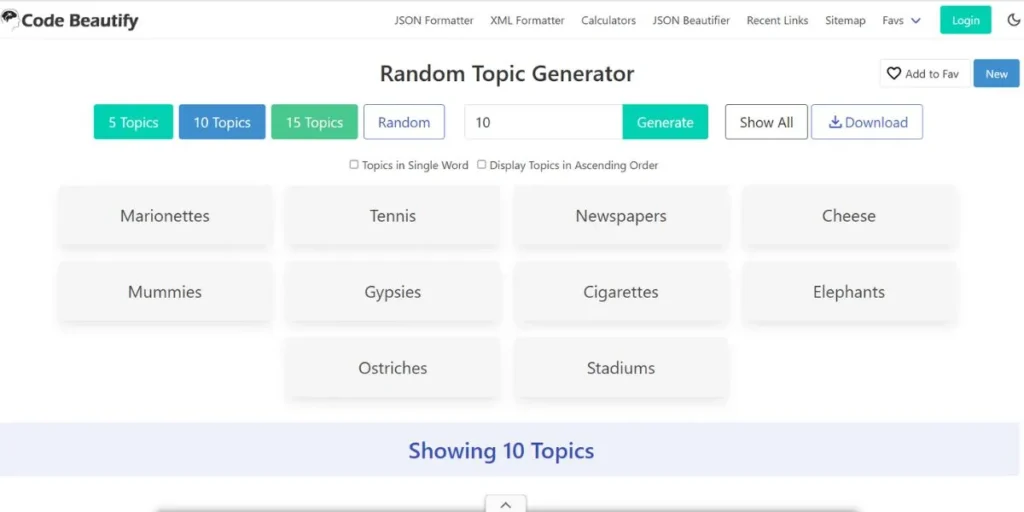
CodeBeautify was the site for programmers only, but now its random topic generator, making it one of the best tools for a programmer, tech writer, or anyone, who needs some topic to write technical tutorials or blog posts. This is a quick tool that gives you a topic with one click. No time wasting, straight output. While it has always been code-focused, its 2025 launch now includes a broader range of tech-related subjects, from cybersecurity to AI, making it a valuable resource for anyone involved in tech work. It’s a no-nonsense tool that is especially great for quickly generating technical content ideas.
Key Features:
- One-click generation
- easy interface.
Pros:
- Super fast and extremely simple to use
- perfect for generating quick ideas.
Cons:
- Very limited
- no customization options or additional features.
Best For: Programmers, technical writers, and developers.
Pricing: Free
Website: https://codebeautify.org/random-topic-generator
7. Frase Blog Outline Generator

Frase is for serious professionals who care about SEO. It’s not a true “random” generator; instead, it takes a keyword and gives you a detailed, rank-optimized outline. It looks at what is currently ranking on Google to provide you with a data-driven approach. If you need not only creative but also search engine-optimized content to win, this is your tool. Frase’s AI crawls search engine results pages (SERPs) to identify the most significant topics and questions that top-performing content addresses. This allows you to create a data-driven outline that is highly likely to rank well in search, so this is a must-have tool for competitive markets.
Key Features:
- AI-powered
- SERP analysis
- whole outline generation
- content optimization.
Pros:
- Generates SEO-friendly outlines
- reduces research time
- Is highly professional.
Cons:
- Not literally a “random” generator
- must enter a specific keyword
- it’s a paid service.
Best For: SEO professionals, content marketing firms, and corporate businesses.
Pricing: Paid plans start around $45/month.
Website: https://frase.io/tools/blog-outline-generator/
8. Scalenut Blog Idea & Outline Generator
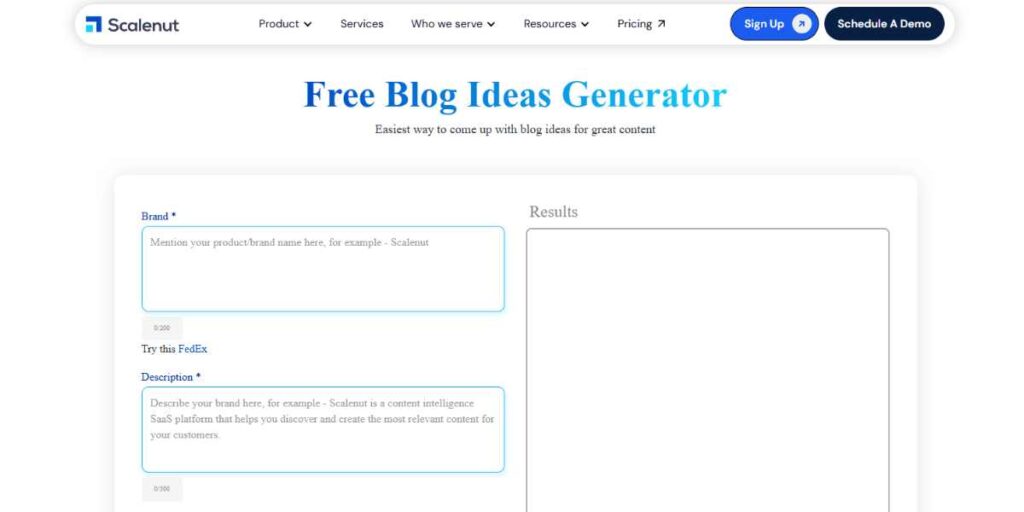
Scalenut is another great AI content website. Its “Cruise Mode” is impressive; it takes you from a keyword all the way up to a draft article in minutes! It’s as if you have a writing assistant who knows precisely what to do. The automation level it provides is ideal for anyone attempting to scale their content game. In 2025, Scalenut has updated its NLP (Natural Language Processing) models to provide you with even better keyword and topic ideas, ensuring your content is complete and relevant. It also comes with a content grade score that updates in real-time as you write, making optimization a game.
Key Features:
- AI-driven
- keyword planner
- content cluster ideas
- Cruise Mode
Pros:
- End-to-end content creation
- SEO-focused
- intuitive interface.
Cons:
- Not so random
- can be expensive for overall platform use.
Best For: SEO marketers, content teams, bulk content creation.
Pricing: They do have some free tools, but paid accounts start at $20/month.
Website: https://www.scalenut.com/tools/blog-outline-generator
9. B12 AI Blog Idea Generator
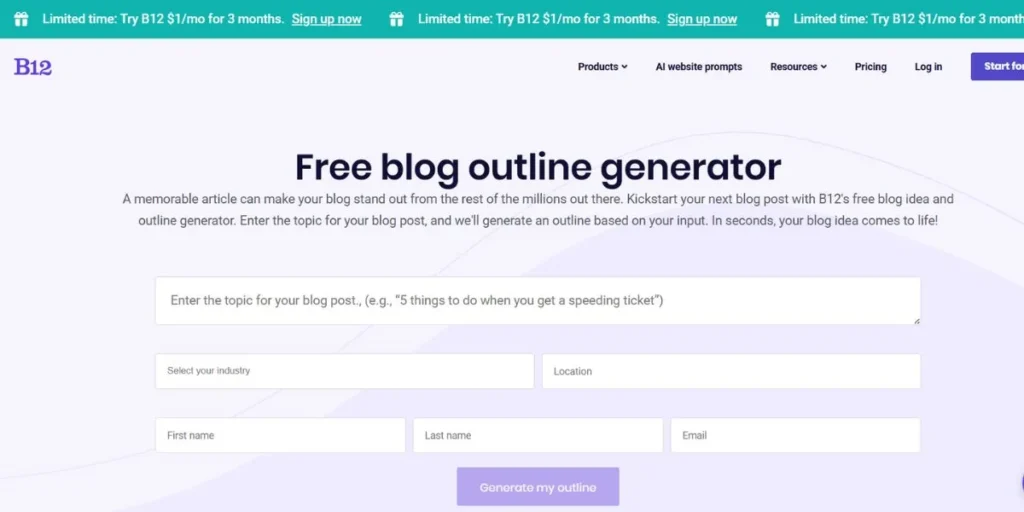
It is a great free tool for small business owners. It is a part of a bigger platform, and it provides blog ideas that are tailored to your specified kind of business. They are specific and actionable for your audience, and that is a massive time-saver if you’re starting with content marketing. The B12 tool, specifically, is suitable for service firms because it generates ideas that specifically address frequent customer questions and pain points. The combination of the overall B12 platform for creating websites and SEO makes it a seamless experience for new entrepreneurs.
Key Features:
- Business-oriented ideas
- AI-powered.
Pros:
- Ideas are tailored to business needs
- simple and easy.
Cons: Not a true “random” generator
- not wide-reaching enough.
Best For: Small business entrepreneurial owners.
Pricing: Free tool, paid plans for the entire B12 platform from $42/month.
Website: https://www.b12.io/
10. Enrich Labs Random Topic Generator

If you’re an entrepreneur at heart, you’ll love this one. Enrich Labs’ generator is designed for businesses and startups. Just give it a prompt, and it will give you loads of fresh, feasible business ideas. The tool is perfect for the creative folks and for anyone who is simply seeking their next big thing. Moreover, the platform’s AI combines disparate concepts into new, potentially viable business ideas, forcing you to think outside the box. It also provides you with suggestions for potential revenue streams and markets, providing you with a solid basis for a business plan.
Key Features:
- Business and startup ideas
- contextually rich suggestions.
Pros:
- Develops unique business ideas
- ideal for entrepreneurs.
Cons:
- Not appropriate for general content ideas or a particular use case.
Best For: Business students, innovators, and entrepreneurs.
Pricing: Free!
Website: https://www.enrichlabs.ai/
Choosing the Right Generator for You
Choosing the ideal random topic generator is based on your purpose, audience, and intent of content creation. The primary considerations in selecting the most suitable tool are discussed below:
1. Determine Your Main Purpose
Various generators have different objectives, and therefore, it is essential to determine what you require:
- Topic ideas that are quick and basic for generic content creation.
- SEO-optimized, fact-based topics for blogging or advertising campaigns.
- Creative writing prompts for storytelling or idea generation.
- Interactive or team-building activities.
2. Evaluate Ease of Use and Accessibility
An easy-to-use interface is a time and effort-saver. Check for:
- Tools with minimal setup and a short learning curve.
- User-friendly panels with manageable dashboards.
- Support for your devices and browsers.
3. Evaluate Advanced Features
Some generators provide an extra set of features that would benefit content creators in their content planning efforts, such as:
- SEO insight, keyword suggestions, and search volume stats.
- Content structuring ideas or AI-generated outlines.
- Ensure integration with content management or marketing software.
4. Assess Suitability for Your Audience
The best generator is one that is well-suited to your target readers or participants:
- Ensure that the generated ideas reflect the tone of your niche.
- Look for the option to personalize prompts or sift through categories.
- Pick tools that support your content type; blog, social media, quizzes, or workshops.
Best Practices When Using These Tools
Don’t simply click “generate” and be done with it. To maximize these tools, observe the following best practices:
- Use them as a starting point: Use the generated topic as an inspiration, and don’t try to stick to it as a script.
- Combine and connect ideas: Experiment by running the random topic generator several times and then searching for methods to combine various suggestions into something unique and more elaborate.
- Add your own flavor: Always put your own voice, know-how, and stamp on the generated topic to make it stand out.
- Do a little research: Even the best randomly generated topic has to be vetted, so always double-check its relevance, search terms, and potential audience interest.
- Don’t be afraid to get creative: The weirdest-sounding topic might be your most successful content.
Common Pitfalls to Avoid
Even the best tool has quirkiness. The following are some traps to watch out for:
- Becoming too dependent: Don’t make the tool do it all! It’s there to help, not replace your own imagination.
- Failing to search for duplicates: Before you sit down at the computer to write, always search to make sure your topic hasn’t been written a million times already.
- Not thinking about your audience: The arbitrary topic is excellent, but it’s only truly great if it’s something your audience will really be interested in.
- Keyword stuffing: Certain AI tools might get a little too keyword-happy. Remember that you’re writing for people first, and search engines second.
Conclusion
As we move towards 2025, the best random topic generator tools are no longer mere prompts; they are sophisticated, AI-powered platforms that can revolutionize the way you approach making content. Whether you’re a stuck writer on an essay or an ad team looking to boost content generation, there’s something for everyone on this list to get you flowing with your creative juices in a matter of seconds.
By embracing these revolutionary generators and using best practices, you’ll be able to overcome creative blocks, discover new possibilities, and generate great, unique content regularly that resonates with your users.
FAQs
What do these generators even accomplish?
The most straightforward ones utilize algorithms to merge and replace words pulled from an insatiable database. The more clever, AI-enabled ones utilize advanced technology to determine what you’re trying to achieve and give you more relevant concepts pulled from present patterns on the internet.
Are they applicable to any form of content?
Absolutely! Many of them are very adaptable. You can apply them to blog posts, social media updates, video scriptwriting, essays, and business ideas. Just pick a tool that is most appropriate to your specific requirements.
Are the suggestions they give me my own?
The concepts are unique combinations of words, yet the real originality is you! Take the idea and add your voice, research, and personality to create something unique.
Do they help with SEO?
Some of the more basic ones don’t, but more advanced, AI-driven platforms such as Scalenut and Frase are actually designed to help you create search-engine-optimized content.
Do I need to pay for a good one?
Nope! There are lots of great free tools that are ideal for newbies. But if you’re a pro who requires more sophisticated features, then paying for a high-end tool may be worthwhile.